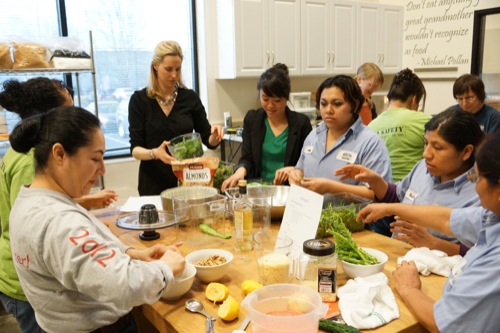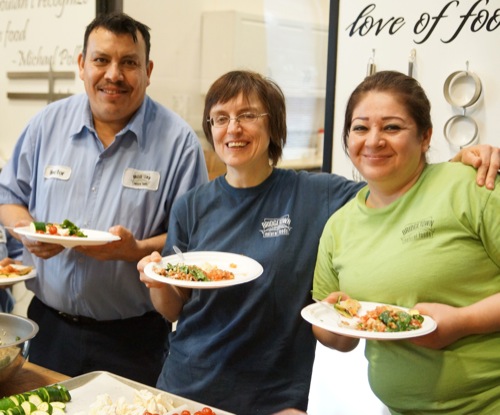 BY LINDA BAKER
BY LINDA BAKER
Bridgetown Natural Foods launched an employee-wellness program to promote healthier eating.
BY LINDA BAKER
Bridgetown Natural Foods had been making a variety of natural and whole-grain products for several years when the owners, husband-and-wife team Dan Klock and Kelly Flatley Klock, realized many of the employees didn’t know how to use some of the core ingredients — oats, quinoa bran — in their own cooking. So this past spring, Bridgetown, based in Southeast Portland, launched an employee-wellness program aimed at incentivizing line workers to eat more nutritious meals.
The focal point is a voluntary on-site cooking class held once a quarter. Participating employees are paid in “Bridgetown Dough,” tokens redeemable at the Lents International Farmers Market or a biweekly on-site farm stand with produce provided by local growers, including Bridgetown neighbor Zenger Farm.
“The underlying reason is to give employees healthier food,” Kelly says. “We’re a growing company,” she adds. “We need our employees to be healthy.”
On a recent Wednesday afternoon, about 20 line workers gathered in the manufacturer’s R&D room. There Bronwen Jones-Broderick, director of business development and a former personal chef, got things started with a quick PowerPoint offering a few frugal shopping tips: Buy pork shoulder on Sunday, then use leftovers to make posole, barbecue pork sandwiches and other meals for the rest of the week.
Next on the agenda was an overview of the menu and associated costs: A frittata cost $0.58 per serving; orange, almond and pomegranate salad, $0.60; and whole-wheat zucchini muffins, $0.23. Teams of employees then set to work whisking, chopping, stirring — and adding aesthetic touches, such as fashioning flowers out of green peppers and tomatoes. “I’m always blown away by the presentation,” Kelly says.
 |
| Bridgetown Natural Foods employees take part in an on-site cooking class. |
In addition to handing out tokens as compensation for the class, the company issues Bridgetown Dough for outstanding workplace performance. Collectively, the different elements of the program cost about $1,000 per month and will likely expand as the company continues to grow. “It’s going to have to take a new form,” Kelly says. But such is the beauty of being business owners. “We have such latitude to create new programs.”
Since many employees are of Vietnamese, Russian and Hispanic descent, Bridgetown works with Zenger Farm to provide culturally appropriate vegetables, such as leeks and bok choy; workers are also encouraged to suggest native meals for the cooking class. To build community — working a factory line is isolating work — Bridgetown invites shift supervisors to attend the cooking sessions.
“We’re a family business, and this allows us all to get around the family table,” says Kelly, who also attends each class.
A health and wellness initiative, Bridgetown Dough has a certain self-serving component: nurturing a new generation of consumers for Bridgetown products and other natural foods. But the program is also part of a larger trend linking healthy eating with employee well-being, recruitment and retention. Consider Chris King Precision Components, the Oregon bike parts manufacturer that recently hired Chris DiMinno, the former chef of acclaimed Portland restaurant Clyde Common, to run its company cafeteria and events programs.
Says Kelly: “It’s all part of a larger corporate commitment to feeding employees well.”


 BY LINDA BAKER
BY LINDA BAKER